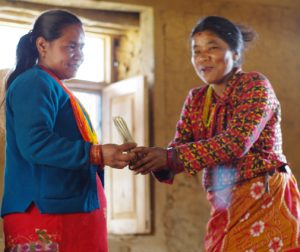
Women’s Empowerment
ETC works directly and intensively with marginalized women, to help them gain the confidence and skills they need to make better lives for themselves and their families.
The root problem: Inequality of opportunity
Although the overall situation has been improving (slowly), women in Nepal still routinely lack access to education, money, and opportunities to participate in public life. Many still do not complete secondary or even primary school. They face lifelong, systematic discrimination due to institutionalized chauvinism and a long-standing cultural preference for sons.

Solution #1: Women’s groups and cooperatives
ETC helps organize geographically-based women’s groups – usually 15-25 women per group. These women’s groups are the basis of many other activities, including entrepreneurial and agricultural training. Women’s group members choose officers, hold monthly meetings, and pool their money to start their own microcredit funds, which they learn to manage and use to launch income-generating activities such as market gardening or livestock enterprises, small shops, etc. The women also benefit socially from peer support and a sense of solidarity.
To ensure long-term sustainability, women’s groups combine to form legally recognized cooperatives. ETC provides training in group management and accounting, but the cooperatives are run entirely by the members themselves. The cooperatives take on the management of the women’s groups’ combined microcredit funds, ensuring that the members have ongoing access to funding for their business start-up and expansion activities.
Each women’s group also selects a Leader Farmer, who has the interest and ability to attend as many of our agricultural trainings as possible. She then disseminates the information gained, and helps distribute resources (e.g., seeds/seedlings, gardening tools), to the members of her group.
Solution #2: Access to useful training and education
In a society where females generally perform more unpaid/domestic duties and are allowed less personal freedom and fewer personal development opportunities than males, improving access to training and education for women is a vital step forward.
Our training activities over the years have included literacy and numeracy classes, group leadership/management training, basic and intermediate financial record-keeping training (applicable to women’s groups and personal business use), health training (see below), gender equity training (to teach women about their legal rights, foster greater mutual respect among spouses, and to encourage parents of both sexes to treat their daughters and sons equally as regards educational opportunities and chore distribution), and a wide variety of agricultural trainings.
Solution #3: Improving Public Health
Rural Nepali women spend countless hours working in the fields, carrying heavy loads, and cooking with wood fuel in poorly ventilated kitchens. Women often eat after the men in their families, and must sustain themselves with whatever food is remaining. Maternal and neonatal health is also hard to come by. Marginalized women and their families also suffer from food insecurity and malnutrition.
ETC works to alleviate these problems by offering a variety of trainings and resources to help women’s group members improve the health and sanitation of their families, homes, and communities. Training topics include boiling drinking water, frequent hand-washing, best practices in prenatal care, and encouragement to use the local health posts where available. ETC also supports the construction of sanitary latrines for households where none already exist; this greatly decreases the incidence of diseases associated with open-air defecation, including hepatitis and chronic intestinal infections. Our agricultural training activities enable all women’s group members to grow greater quantities of more nutritious food, both for their families and to sell for profit.
The results
Through their newfound skills and knowledge, women to improve their own and their families’ well-being. Access to credit allows them to start or expand their income-generating activities, resulting in increased household income – up to 50% or even more, for some women. They also take initiative to become more active in their communities, at their children’s schools, in their women’s groups and cooperatives, and even by running for public office. Through their hard work and determination, they not only build their own self-esteem, but also gain respect from the men in their lives.